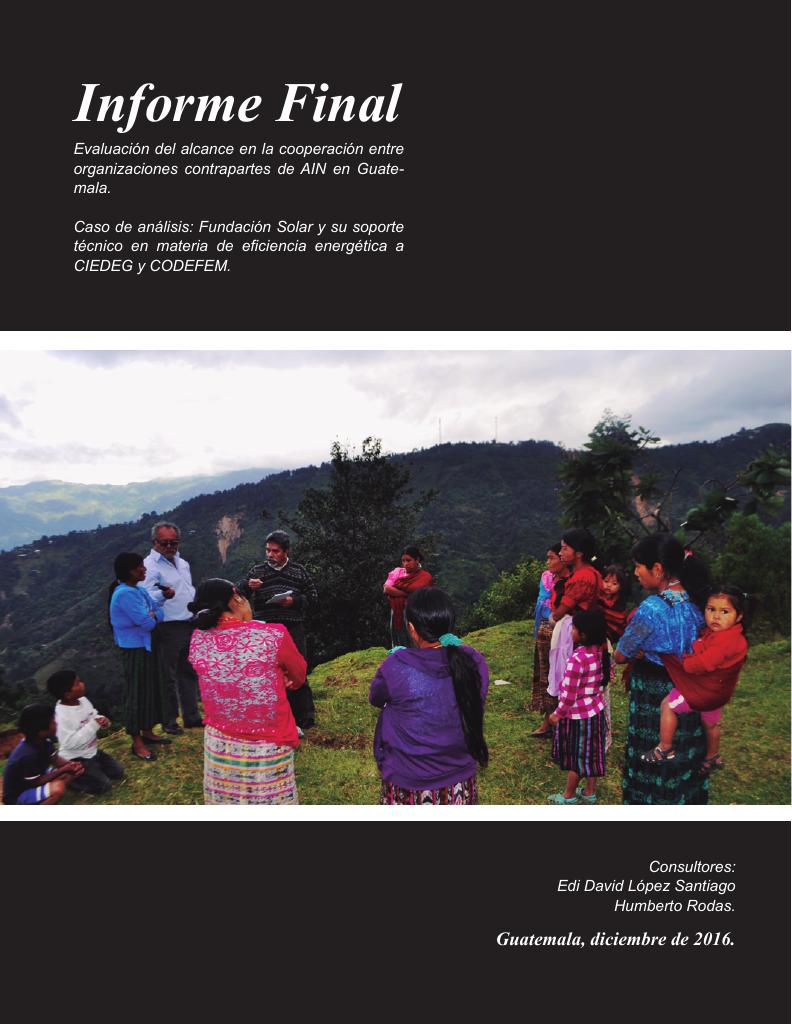Evaluering
Evaluation of the scope of the cooperation between NCA partner organizations in Guatemala
Background As part of its 2016-2020 strategic plan, NCA planned to have in 2016 an externalevaluation about the impact and work of Fundación Solar, which is categorized by NCAas resource partner addressing energy efficiency and climate resilience issues, mainly. The collaborative work and assistance of Fundación Solar with CIEDEG and CODEFEMwas focussed in this assessment that also supports to NCA with some learnings aboutits own Partnership Policy application and implementation. Purpose/ Objective Assess the effectiveness both in the NCA application of the categories of partnerorganizations and in the cooperation that has developed between three linked nationalpartners. Methodology This evaluative process was done according to the proposed methodology, divided intothree moments: documentation review, work in the field in the city and thecommunities through focus groups and interviews. With this procedure the evaluationteam was able to compare information bringing to a comprehensive vision of thedeveloped coordination between the different actors involved. Key Findings The relation and cooperation between NCA and its national partners, as well as thecoordination between the partners, is conditioned by NCA categorization of core andresource partners. This categorization is only NCA application for programmatic issuesbut it is not the own recognition of the partners, necessarily. Particularly, the evaluation determined that NCA was unable to define a territorialwork strategy, nor to construct a methodology of coordination between FundaciónSolar (core partner) with CIEDEG (core) and CODEFEM (resource). This gap did notfacilitate the strategic coordination between the three partners that were assessedbecause there was no directionality and clarity. This situation and the complex realityof the communities and Guatemala, significantly conditioned the work evaluated. One important finding is that the effective coordination was made by theworkers/technicians of the assessed partners in the field more than the leadershipcoordination. The people in the field who in the practice saw the importance ofcoordinating and not duplicating efforts; as well as not wearing down the activities ofwomen's groups, subjects of the actions done. It was evidenced the importance tocomplement the strengths of the two organizations. The operative/field coordinationwas well assessed but not the strategic coordination. It seems that this situation didnot allow to achieve better results and impact. Among the main results found in the evaluation, are: The coordination initiative/project was adapted to the context situation of adaptation to climate change, the conditions of poverty and the political situation.Cultural and environmental practices improved in the target communities thatcontributed to family health and economy as well as advocacy at municipal level.This through the forest management and the installation of improved stoves. The initiative/project had an adequate complement between the topics and actionsfor the prevention of disasters and climate change. Women’s organization capacity was improved including their advocacy. Women’stechnical skills were developed for the maintenance of the improved stoves. Advocacy to the municipality authorities both to support the stoves installation aswell as with the forest management was strengthened. The reduction in the use offirewood results in the decrease of logging as a measure of climate adaptation Recommendations The coordination between partners must be an agreed exercise defining common strategies and methodology to all the actions to be implemented mainly for complementary work. To sustain the actions to be implemented, all partners’ coordination must prioritizemainly the communities’ capacities strengthening and secondly the capacitiesdevelopment of the partners’ staff. Comments from Norwegian Church Aid In 14 December 2016, Fundación Solar informed to NCA that their Executive Boarddecided to end the cooperation with NCA due to the change of their geographical areapriority from 2017 which is no longer aligned with NCA coverage strategy.
